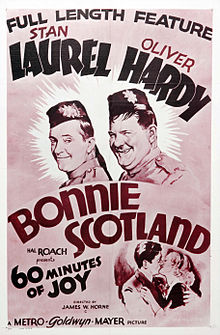
Laurel and Hardy were a British-American comedy team during the early Classical Hollywood era of American cinema, consisting of Englishman Stan Laurel (1890–1965) and American Oliver Hardy (1892–1957). Starting their career as a duo in the silent film era, they later successfully transitioned to "talkies". From the late 1920s to the mid-1950s, they were internationally famous for their slapstick comedy, with Laurel playing the clumsy, childlike friend to Hardy's pompous bully. Their signature theme song, known as "The Cuckoo Song", "Ku-Ku", or "The Dance of the Cuckoos" was heard over their films' opening credits, and became as emblematic of them as their bowler hats.

Oliver Norvell Hardy was an American comic actor and one half of Laurel and Hardy, the double act that began in the era of silent films and lasted from 1926 to 1957. He appeared with his comedy partner Stan Laurel in 107 short films, feature films, and cameo roles. He was credited with his first film, Outwitting Dad, in 1914. In most of his silent films before joining producer Hal Roach, he was billed on screen as Babe Hardy.

Stan Laurel was an English comic actor, director and writer who was one half of the comedy duo Laurel and Hardy. He appeared with his comedy partner Oliver Hardy in 107 short films, feature films and cameo roles.

James Henderson Finlayson was a Scottish actor who worked in both silent and sound comedies. Balding, with a fake moustache, he had many trademark comic mannerisms—including his squinting, outraged double-take reactions, and his characteristic exclamation: "D'ooooooh!" He is the best remembered comic foil of Laurel and Hardy.
Big Business is a 1929 silent Laurel and Hardy comedy short subject directed by James W. Horne and supervised by Leo McCarey from a McCarey (uncredited) and H. M. Walker script. The film, largely about tit-for-tat vandalism between Laurel and Hardy as Christmas tree salesmen and the man who rejects them, was deemed culturally significant and entered into the National Film Registry in 1992.
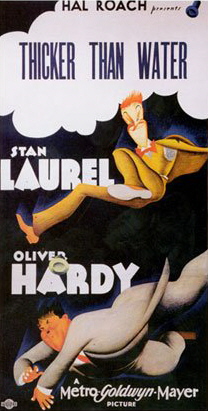
Thicker than Water is a short film starring Laurel and Hardy, directed by James W. Horne, produced by Hal Roach, and released in 1935 by Metro-Goldwyn-Mayer. The short also features James Finlayson and Daphne Pollard in supporting roles. It was the last two-reel comedy starring the comedy team, as Hal Roach decided to end Laurel and Hardy short films and move them solely into feature films.

A Chump at Oxford is a Hal Roach comedy film produced in 1939 and released in 1940 by United Artists. It was directed by Alfred J. Goulding and is the penultimate Laurel and Hardy film made at the Roach studio. The title echoes the film A Yank at Oxford (1938), of which it is a partial parody.

Zenobia is a 1939 comedy film directed by Gordon Douglas and starring Oliver Hardy, Harry Langdon, Billie Burke, Alice Brady, James Ellison, Jean Parker, June Lang, Stepin Fetchit and Hattie McDaniel. The source of the film was the 1891 short story "Zenobia's Infidelity" by H.C. Bunner, which was originally purchased by producer Hal Roach as a vehicle for Roland Young.

Chickens Come Home is a 1931 American pre-Code short film starring Laurel and Hardy, directed by James W. Horne and produced by Hal Roach. It was shot in January 1931 and released on February 21, 1931. It is a remake of the 1927 silent film Love 'em and Weep in which James Finlayson plays Hardy's role and Hardy plays a party guest.
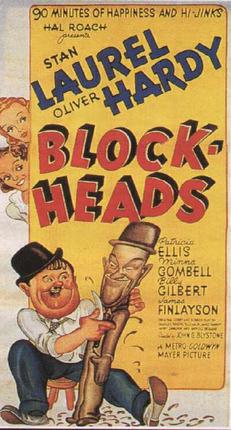
Block-Heads is a 1938 American comedy film directed by John G. Blystone and starring Stan Laurel and Oliver Hardy. It was produced by Hal Roach Studios for Metro-Goldwyn-Mayer. The film, a reworking of elements from the Laurel and Hardy shorts We Faw Down (1928) and Unaccustomed As We Are (1929), was Roach's final film for MGM.

Flying Elephants is a two-reel silent film from 1928 directed by Frank Butler and co-written and produced by Hal Roach. It stars Stan Laurel and Oliver Hardy as a pair of battling cavemen.
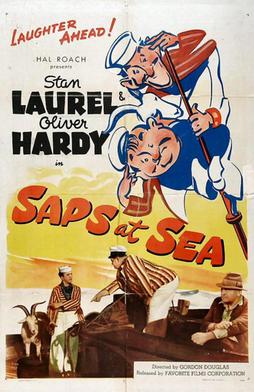
Saps at Sea is a 1940 American comedy film directed by Gordon Douglas, distributed by United Artists. It was Laurel and Hardy's last film produced by the Hal Roach Studios, as well as the last film to feature Ben Turpin and Harry Bernard.

Another Fine Mess is a 1930 short comedy film directed by James Parrott and starring Laurel and Hardy. It is based on the 1908 play Home from the Honeymoon by Arthur J. Jefferson, Stan Laurel's father, and is a remake of their earlier silent film Duck Soup.

The Bohemian Girl is a 1936 comedic feature film version of the opera The Bohemian Girl by Michael William Balfe. Directed by James W. Horne and Charles Rogers, and it was produced at the Hal Roach Studios, and stars Laurel and Hardy, and Thelma Todd in her final film role. Mae Busch and Oliver Hardy appeared 13 times, this was their last picture together. This was also the only appearance of Darla Hood in a full-length feature produced by Hal Roach.
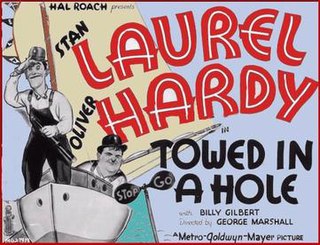
Towed in a Hole is a 1932 pre-Code comedy film starring Laurel and Hardy. The "two-reeler" short was produced by Hal Roach, directed by George Marshall, and distributed by Metro-Goldwyn-Mayer.
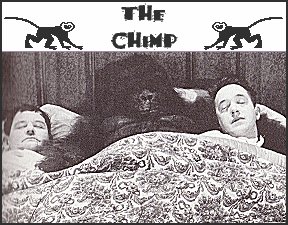
The Chimp is a Laurel and Hardy short film made in 1932. It was directed by James Parrott, produced by Hal Roach, and distributed by Metro-Goldwyn-Mayer. The second half of the film is a reworking from their last silent film Angora Love (1929), itself reworked into a short film the previous year, Laughing Gravy (1931).
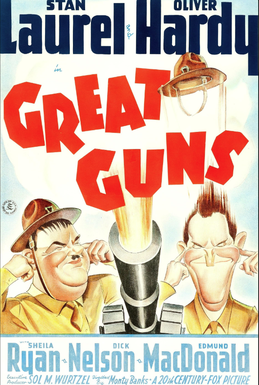
Great Guns is a 1941 American comedy film starring Laurel and Hardy. It was directed by Monty Banks, and produced by Sol M. Wurtzel for 20th Century-Fox.

Pick a Star is a 1937 American musical comedy film starring Rosina Lawrence, Jack Haley, Patsy Kelly and Mischa Auer, directed by Edward Sedgwick, produced by Hal Roach and released through Metro-Goldwyn-Mayer, and filmed by Norbert Brodine. A reworking of Buster Keaton's first talkie, Free and Easy, the film is mostly remembered today for two short scenes featuring Laurel and Hardy.

Madame Mystery is a 1926 American silent comedy film starring Theda Bara, Oliver Hardy, and James Finlayson, directed by Richard Wallace and Stan Laurel, co-written by Laurel, and produced by Hal Roach. Footage from this film was reused in the Hal Roach two-reeler 45 Minutes From Hollywood.

Stan & Ollie is a 2018 biographical comedy-drama film directed by Jon S. Baird. The script, written by Jeff Pope, was inspired by Laurel and Hardy: The British Tours by A.J. Marriot which chronicled the later years of the comedy double act Laurel and Hardy; the film stars Steve Coogan and John C. Reilly as Stan Laurel and Oliver Hardy. The film focuses on details of the comedy duo's personal relationship while relating how they embarked on a gruelling music hall tour of the United Kingdom and Ireland during 1953 and struggled to get another film made.
